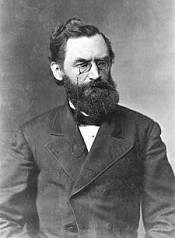Schurz Carl

Carl Schurz (March 2, 1829 – May 14, 1906) was a German revolutionary, American statesman and reformer, and Union Army General in the American Civil War. He was also an accomplished journalist, newspaper editor and noted orator, who in 1869 became the first German-born American elected to the United States Senate.[1] His wife, Margarethe Schurz, and her sister, Berthe von Ronge, were instrumental in establishing the kindergarten system in the United States.[2] During his later years, Schurz was perhaps the most prominent independent in American politics, noted for his high principles, his avoidance of political partisanship, and his moral conscience.[3] He is famous for saying: "My country, right or wrong; if right, to be kept right; and if wrong, to be set right."[4] Many streets, schools, and parks are named in honor of him, including New York City's Carl Schurz Park. Schurz was born in Liblar (now part of Erftstadt), Germany on March 2, 1829, the son of a schoolteacher. He studied at the Jesuit Gymnasium of Cologne, and also studied the piano under private instructors. Financial problems in his family obligated him to leave school a year early, without graduating, so he could help sort out his family's tangled financial affairs. Later he graduated from the gymnasium by passing a special examination and entered the University of Bonn. At Bonn, a friendship developed with one of his professors, Gottfried Kinkel, that was to much influence his life for the next few years. He joined the nationalistic Studentenverbindung Burschenschaft Franconia at Bonn, which at the time included Friedrich von Spielhagen, Johannes Overbeck, Julius Schmidt, Carl Otto Weber, Ludwig Meyer and Adolf Strodtmann among its members.[5] In response to the early events of the revolutions of 1848, Schurz and Kinkel started the Bonner Zeitung, a paper advocating democratic reforms. At first Kinkel was the editor and Schurz a regular contributor. These roles were reversed when Kinkel left for Berlin to become a member of the Prussian Constitutional Convention.[6] When the Frankfurt rump parliament called for people to take up arms in defense of the new German constitution, Schurz, Kinkel, and others from the University of Bonn community did so. During this struggle, Schurz became acquainted with Franz Sigel, Alexander Schimmelfennig, Fritz Anneke, Friedrich Beust, Ludwig Blenker and others, many of whom he would meet again in the Union Army during the U.S. Civil War. The revolution in Germany ultimately failed. When the fortress at Rastatt, the last holdout, surrendered with Schurz inside, Schurz escaped to Zürich. In 1850, he returned secretly to Prussia, rescued Kinkel from prison at Spandau and helped him to escape to Edinburgh, Scotland. Schurz then went to Paris, but the police forced him to leave France on the eve of the coup d'état of 1851, and he moved to London. Remaining there until August 1852, he made his living by teaching the German language. He married fellow revolutionary Johannes von Ronge's sister-in-law, Margarethe Meyer, in July 1852 and then moved to America. Living initially in Philadelphia, Pennsylvania, the Schurzes moved to Watertown, Wisconsin, where Carl nurtured his interests in politics and Margarethe began her seminal work in early childhood education. Schurz is probably the best known of the Forty-Eighters, the German emigrants who came to the United States after the failed liberal revolutions. In 1855, Schurz settled in Watertown, Wisconsin, where he immediately became immersed in the anti-slavery movement and in politics, joining the Republican Party of Wisconsin. In 1857, he was an unsuccessful Republican candidate for lieutenant-governor. In the Illinois campaign of the next year between Abraham Lincoln and Stephen A. Douglas, he took part as a speaker on behalf of Lincoln—mostly in German—which raised Lincoln's popularity among German-American voters. Later, in 1858, he was admitted to the Wisconsin bar and began to practice law in Milwaukee. In the state campaign of 1859, he made a speech attacking the Fugitive Slave Law and arguing for state's rights. Outside of the state, in Faneuil Hall, Boston, on April 18, 1859,[7] he delivered an oration on "True Americanism," which, coming from an alien, was intended to clear the Republican party of the charge of "nativism". The Germans of Wisconsin unsuccessfully urged his nomination for governor by the Republican party in 1859. In the 1860 Republican National Convention, Schurz was spokesman of the delegation from Wisconsin, which voted for William H. Seward; despite this, Schurz was on the committee which brought Lincoln the news of his nomination. In spite of Seward's objection, grounded on Schurz's European record as a revolutionary, Lincoln sent him in 1861 as ambassador to Spain. He succeeded in quietly dissuading Spain from supporting the South. Persuading Lincoln to grant him a commission in the Union army, Schurz was commissioned brigadier general of Union volunteers in April, and in June took command of a division, first under John C. Frémont, and then in Franz Sigel's corps, with which he took part in the Second Battle of Bull Run. He was promoted major general of volunteers on March 14 and was a division commander in the XI Corps at the Battle of Chancellorsville, under General Oliver O. Howard, with whom he later had a bitter controversy over the strategy employed at that battle, resulting in their defeat by Thomas J. "Stonewall" Jackson. He was at Gettysburg (a victory for the Union) commanding the Third Division of Howard's XI Corps, and at Chattanooga (also a victory for the Union side). Later, he was put in command of a Corps of Instruction at Nashville. He briefly returned to active service, where in the last months of the war when he was with Sherman's army in North Carolina as chief of staff of Henry Slocum's Army of Georgia. He resigned from the army when the war ended. In the summer of 1865, President Andrew Johnson sent Schurz through the South to study conditions; they then quarrelled because Schurz approved General H.W. Slocum's order forbidding the organization of militia in Mississippi. Schurz's report, suggesting the readmission of the states with complete rights and the investigation of the need of further legislation by a Congressional committee, was ignored by the President. In 1866, Schurz moved to Detroit, where he was chief editor of the Detroit Post. The following year, he moved to St. Louis, becoming editor and joint proprietor with Emil Praetorius of the Westliche Post (Western Post), where he hired Joseph Pulitzer as a cub reporter. In the winter of 1867-1868, he travelled in Germany – the account of his interview with Otto von Bismarck is one of the most interesting chapters of his Reminiscences. He spoke against "repudiation" (of war debts) and for "honest money" (the gold standard) during the Presidential campaign of 1868. In 1869, he was elected to the United States Senate from Missouri, becoming the first German American in that body. He earned a reputation for his speeches, which advocated fiscal responsibility, anti-imperialism, and integrity in government. During this period, he broke with the Grant administration, starting the Liberal Republican movement in Missouri, which in 1870 elected B. Gratz Brown governor. Schurz opposed Grant's bid to annex Santo Domingo — after Fessenden's death, Schurz was a member of the Committee on Foreign Affairs — his Southern policy, and the government's selling arms and making cartridges for the French army in the Franco-Prussian War. In 1872, he presided over the Liberal Republican convention, which nominated Horace Greeley for President. Schurz's own choice was Charles Francis Adams or Lyman Trumbull, and the convention did not represent Schurz's views on the tariff. Schurz campaigned for Greeley anyway. Especially in this campaign, and throughout his career as a Senator and afterwards, he was a target for the pen of Harper's Weekly artist Thomas Nast, usually in an unfavorable way.[8] The election was a debacle for the Greeley supporters: Grant won by a landslide, and Greeley died. In 1875, he campaigned for Rutherford B. Hayes, as the representative of sound money, in the Ohio governor's campaign. In 1876, he supported Hayes for President, and Hayes named him Secretary of the Interior, following much of his advice in other cabinet appointments and in his inaugural address. In this department, Schurz put in force his theories in regard to merit in the Civil Service, permitting no removals except for cause, and requiring competitive examinations for candidates for clerkships. His efforts to remove political patronage met with limited success. As an early conservationist, he prosecuted land thieves and attracted public attention to the necessity of forest preservation. During Schurz's tenure as Secretary of the Interior, there was a movement, strongly supported by Gen. William Tecumseh Sherman, to transfer the Office of Indian Affairs to the War Department.[9] Restoration of the Indian Office to the War Department, which was anxious to regain control in order to continue its "pacification" program, was opposed by Schurz, and ultimately the Indian Office remained in the Interior Department. The Indian Office had been the most corrupt of the Interior Department. Positions there were based on political patronage and seen as granting license to use the reservations for personal enrichment. Schurz realized that the service would have to be cleansed of corruption before anything positive could be accomplished, so he instituted a wide-scale inspection of the service, dismissed several officials, and began civil service reforms, where positions and promotions were based on merit, not political patronage.[10] Schurz's leadership of the Indian Affairs Office was not uncontroversial. His role in the abrogation of treaties made with various native American Indian tribes is chronicled in Dee Brown's work, Bury My Heart at Wounded Knee. While certainly not an architect of the campaign to push Native Americans off their lands and into tribal reservations, Schurz continued the previous practice of the Bureau of Indian Affairs of resettling tribes on reservations. In response to several nineteenth century reformers, however, Schurz later rescinded his approval of the policy of removing Indians from their homelands, promoting assimilationist policies that were in favor among reformers at the time.[11][12]
do you like this author?
What readers are saying
What do you think? Write your own comment on this book!
write a commentWhat readers are saying
What do you think? Write your own comment on this author!
write a commentBook list

speeches correspondence and political papers of carl schurz volume 1
Series:
Unknown
Year:
Unknown
Raiting:
4.5/5
Show more
add to favoritesadd In favorites

speech of hon carl schurz of missouri at indianapolis indiana july 20 1880
Series:
Unknown
Year:
Unknown
Raiting:
5/5
Show more
add to favoritesadd In favorites
Book list

speeches correspondence and political papers of carl schurz volume 1
Series:
Unknown
Year:
Unknown
Raiting:
4.5/5
Show more
add to favoritesadd In favorites

speech of hon carl schurz of missouri at indianapolis indiana july 20 1880
Series:
Unknown
Year:
Unknown
Raiting:
5/5
Show more
add to favoritesadd In favorites

life of henry clay volume 1
Series:
Unknown
Year:
Unknown
Raiting:
3/5
This Elibron Classics book is a facsimile reprint of a 1915 edition by Houghton and Mifflin Company, Boston and New York.
Show more
add to favoritesadd In favorites

judge douglas the bill of indictment speech of carl schurz of wisconsin at
Series:
Unknown
Year:
Unknown
Raiting:
4/5
Show more
add to favoritesadd In favorites

douglas and popular sovereignty speech of carl schurz of wisconsin in hampden
Series:
Unknown
Year:
Unknown
Raiting:
4/5
Show more
add to favoritesadd In favorites

american imperialism the convocation address delivered on the occasion of the t
Series:
Unknown
Year:
Unknown
Raiting:
3.5/5
Show more
add to favoritesadd In favorites

american imperialism the convocation address delivered on the occasion of the
Series:
Unknown
Year:
Unknown
Raiting:
3/5
Show more
add to favoritesadd In favorites

abraham lincoln a biographical essay
Series:
Unknown
Year:
Unknown
Raiting:
4/5
This volume is produced from digital images created through the University of Michigan University Library's large-scale digitization efforts. The Library seeks to preserve the intellectual content of items in a manner that facilitates and promotes a variety of uses. The digital reformatting process results in an electronic version of the original text that can be both accessed online and used to create new print copies. The Library also understands and values the usefulness of print and makes reprints available to the public whenever possible. This book and hundreds of thousands of others can be found in the HathiTrust, an archive of the digitized collections of many great research libraries. For access to the University of Michigan Library's digital collections, please see http://www.lib.umich.edu and for information about the HathiTrust, please visit http://www.hathitrust.org
Show more
add to favoritesadd In favorites

a memorial of charles sumner from the city of boston
Series:
Unknown
Year:
Unknown
Raiting:
2.5/5
Show more
add to favoritesadd In favorites

Report on the Condition of the South
Series:
Unknown
Year:
Unknown
Raiting:
2.5/5
It is a well-known fact that in the States south of Tennessee and North Carolina the number of white Unionists who during the war actively aided the government or at least openly professed their attachment to the cause of the Union was very small.
Show more
add to favoritesadd In favorites
What readers are saying
What do you think? Write your own comment on this author!
write a commentif you like Schurz Carl try:
readers also enjoyed
What readers are saying
What do you think? Write your own comment on this author!
write a commentGenre
if you like Schurz Carl try:
readers also enjoyed
Do you want to read a book that interests you? It’s EASY!
Create an account and send a request for reading to other users on the Webpage of the book!


